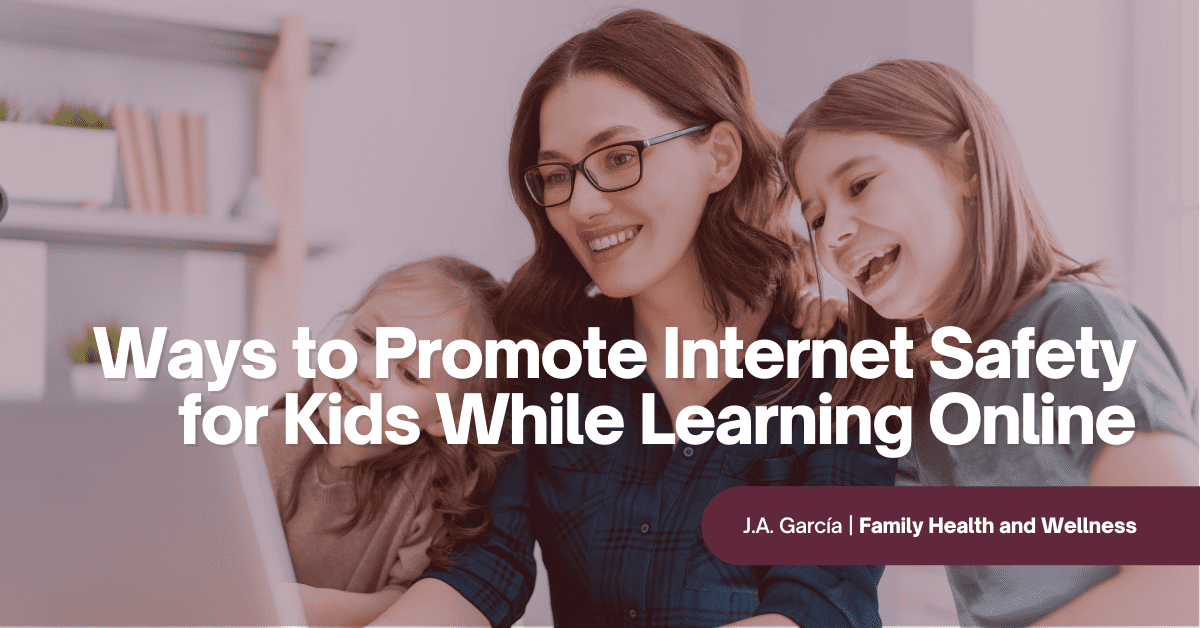
Ways to Promote Internet Safety for Kids While Learning Online
Online classes are excellent for your children, but you must also learn about internet safety for kids.
The Internet is an excellent tool, but it’s full of dangers and inappropriate content. So, parents must know about internet safety to identify dangers and learn how to deal with them promptly and accurately.
This article has tips on how to keep your kids safe on the internet because we want them to have a good time when they start learning online.
Let’s dive right in!
Try out Homeschool Spanish Academy at no risk!
Sign up for your free accredited online Spanish class today. ➡️

The Importance of Internet Safety for Kids
Between 2017 and 2019, the international think tank DQ Institute carried out a study on the state of children’s internet safety online. The study was done in 30 countries, and they surveyed children between the ages of 8 and 12 who had access to the Internet.
The study argues that girls, boys, and teenagers are more likely to come across violence on the Internet. After all, the world is at its fingertips.
They are constantly online for schoolwork and homework on their computers, mobile phones, tablets, and TVs.
The DQ Institute goes on to say that such independence and unsupervised online behavior can lead to severe consequences. They cite developmental and mental health issues, plus the fact that the personal integrity of children is often at risk. We’re talking about online harassment, extortion, or worse. More on this
This is why it’s so important to get involved in your children’s education and always watch their devices.
But don’t despair!
If you take practical steps to keep your kids safe on the internet, you can keep them away from content and activities that could be harmful or inappropriate.
This way, your child gets to make the most of their online learning experience, exploit the creative potential of the Internet, and even connect with others.
Potential Risks and Dangers for Kids From Learning Online
According to a Raising Children article, there are four main internet risks for children.
1. Content Risks
This includes inappropriate images, including cruelty to animals and others.
2. Contact Risks
These risks are situations where children come into contact with strangers or adults posing as children. This can make kids give out personal information, talk to people who want to hurt them or even agree to meet the person in person.
3. Conduct Risks
This involves children acting in ways that might hurt others. In the same way, they can be hurt by cruel online posts or pictures, online threats, harassment, and negative comments.
4. Contract Risks
The use of apps, games, or toys with weak internet security can lead to identity theft or fraud. On the other hand, kids might give out personal information like credit card numbers when they buy things online or sign contracts.
Strategies To Promote Internet Safety for Kids
You might be a little scared right now, and it’s okay to worry. But the Internet is still an important tool. To be honest, your children will most likely need to use it every day.
So, the best option is to devise methods of protecting your children and family.
Set Boundaries
Rebbeca Edwards, Security Expert, Safety & Tech Reporter, recommends limiting screen time not only for playing or social media time but also for homework and research.
This will let your kids know that you know what they are doing and that they have a time limit to complete their tasks.
Monitor online activity
Whenever you can sit next to your children while they browse the Internet.
According to Edwards, this will let you see what websites they use to find information, play games, or talk with their friends, and if those sites can be trusted.
You will also be able to see how they behave on social media apps like Tik Tok or Instagram and what kind of interactions they have with the people they follow.
Educate children about internet safety
Edwards goes on to say that communication is always the best approach to letting your children know that you are there for them and want the best for them.
So, you must explain what’s dangerous on the Internet, talk to your children about online safety, and tell them they can talk to you whenever they feel something is up.
The final take?
Talk to your children regularly. Ask them how they feel when they’re online. Teach them the importance of being careful with the information they share online.
And don’t forget that the goal is for them to use the Internet safely, responsibly, and enjoyably, not to ban them from using it.
Take a look at this quote from Raising Children: “If you teach your child how to manage internet safety risks and worrying experiences, your child will build digital resilience.”
Inspiring, isn’t it?
Encourage Kindness
Going back to the study made by the DQ Institute, it says that up to 45% of all students were victims of cyberbullying, which damaged their reputations.
So, promoting good behavior during online classes, connectivity with other kids in online gaming, and positive social media interactions are important.
Kids must also avoid teasing other classmates and refrain from spreading rumors or hurtful comments.
UNICEF recommends parents pay attention to sudden changes in their kids’ behavior during their online activities, as they might be signs that they could be experiencing some kind of abuse.
The Role Parents Have in Promoting Internet Safety
According to the National Cybersecurity Alliance, parents must explain to their children the repercussions, risks, and benefits of the Internet.
It doesn’t matter that you are not a technology expert; with some guidance, you can improve your children’s internet safety.
The goal is to make online learning a safe space for your children.
A great way to start is to tell kids that any information they share online, such as emails, passwords, photos, or videos, can easily be copied and pasted elsewhere.
They must also know that any interaction on social media, like comments, reactions, posts, or photographs, can affect their reputation and have an impact on relationships and even job and university applications.
And last but not least, we encourage you to give your kids the tools they need to handle things on their own. After all, they may experience situations or have close friends dealing with online security issues.
Come up with a plan for each situation, and work on a guidebook that your kids can check if they need it.
There are ways to practice internet safety. But it’s vital to teach your kids how to react and what steps to follow if danger arises.
Build trust as well. Tell them they can always talk to you or a teacher.
Make the Internet Safe for Your Children
In this article, we included some tips about online safety for kids and how you, as a parent, can teach them about the importance of being safe when they use the Internet.
Another great tip is to point them in the right direction.
You can sign them up for a Spanish class at Homeschool Spanish Academy!
With us, you can access online, flexible, and individualized sessions with our certified, native-speaking teachers.
Check out our affordable pricing and flexible programs, and sign up for a free trial class today!
Hear Your Child Speak Spanish! Your Free Trial Class Is Waiting ➡️

Join one of the 40,000 classes that we teach each month and you can experience results like these…

“This is the best way for your kid to learn Spanish. It’s one-on-one, taught by native Spanish speakers, and uses a curriculum.”
– Sharon K, Parent of 3

“It’s a great way to learn Spanish, from native Spanish speakers in a 1-on-1 environment. It’s been fairly easy to schedule classes around my daughter’s other classes. The best value for us has been ordering multiple classes at a time. All the instructors have been great!”
– Cindy D, Parent of 3

“HSA offers very affordable, quality, one on one classes with a native speaker. My son has greatly benefited from taking classes. We have seen his confidence increase as well as his pronunciation improve, because he learns from a native Spanish speaker. HSA has quick, personal customer service. Our family has been very pleased with our experience so far!”
– Erica P. Parent of 1
Want free Spanish lessons, fun content, and easy learning strategies for kids? Check these out!
- How to Immerse Yourself in Spanish While at Home
- Ver Conjugation: Free Spanish Lesson, Exercises, and PDF
- What Are the Different Levels of Language Proficiency?
- What Is And How To Master AP Spanish Language
- What Does it Actually Take to Become Fluent in Spanish?
- How You Can Encourage Your Child To Speak Spanish at Home
- Keep Your Spanish Skills Sharp Over Summer Vacation
- All You Need to Know About Spanish as a Second Language
- What Does it Actually Take to Become Fluent in Spanish? - August 29, 2024
- Learn About Hispanic History: Were Hispanics Slaves? - May 30, 2024
- Turn Your Life Around: From Passive Bilingualism to Fluency! - April 4, 2024





